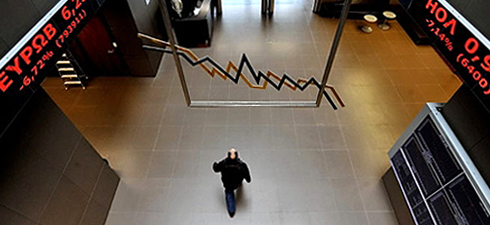"Market speculators are again betting that Greece will go bankrupt," writes Eleftherotypia. "As a result, the stock market is panicking, and the country's bond yield went above 7% on April 8, while Germany borrows at 3%. Most European stock markets ended the day down, and the forecasts are not encouraging. The worst was avoided only because of the encouraging statements from European Central Bank President Jean-Claude Trichet." Calling the day "Black Thursday", the Greek daily warns that the turmoil "could be prolonged" as "speculators effectively short Greek debt by starting rumours that the bailout plan for Greece", approved by Eurozone member states at the end of March, "lacks structure".
IMF presence doesn't inspire public's confidence
ForIl Sole 24 Ore, the bailout plan's weakness stems from its "opacity in terms of implementation" and "the lack of sanctions for speculators". The Italian financial daily points out that speculation resumed because "after months of talking about measures to limit speculation" nothing was done.
Foggy and shaky as the plan may be, Eleftherotypia says "Greece will have to take advantage of it despite government assurances to the contrary, because the economic situation remains worrying." The presence in Athens of two International Monetary Fund delegations reintroduces the possibility of assistance from that US institution, which "doesn't restore the Greek public's confidence", the daily adds. Similarly, the Financial Times observes, "The Greek government is having difficulty convincing its people of the magnitude of the country’s problems and the required internal adjustments. As a result, Greece is unable to provide sufficient assurances to its creditors. This accentuates the hesitancy of exceptional financiers, such as Germany."
Greek crisis could affect Balkans
The British financial daily says, "The major issues in this complex case can be summarised by a relatively simple observation: that the solution to Greece’s problems is undermined by the inability of the major players credibly to commit to the required high level of co-ordination and trust. It is a classic co-ordination failure in game theory. Any first mover will become worse off. Indeed, it is in the interest of any single party to wait for others to move first." As a result, paralysis takes hold and speculators take advantage of the immobility.
Germany's Die Presse raises concern about the domino effect of the Greek crisis on the Balkans, where Greek banks and investors have a heavy footprint and constitute a major driver of growth, as well as the impact on the efforts of Romania and Bulgaria to join the euro zone. *Süddeutsche Zeitung*, conversely, writes about a possible positive outcome for Germany. While assistance to Greece would cost Berlin some €5.4 billion this year, with the help of a stabilised situation, the country would have to repay its debt at a rate of about 2%, representing a profit of more than €200 million for Germany.
Was this article useful? If so we are delighted!
It is freely available because we believe that the right to free and independent information is essential for democracy. But this right is not guaranteed forever, and independence comes at a cost. We need your support in order to continue publishing independent, multilingual news for all Europeans.
Discover our subscription offers and their exclusive benefits and become a member of our community now!












